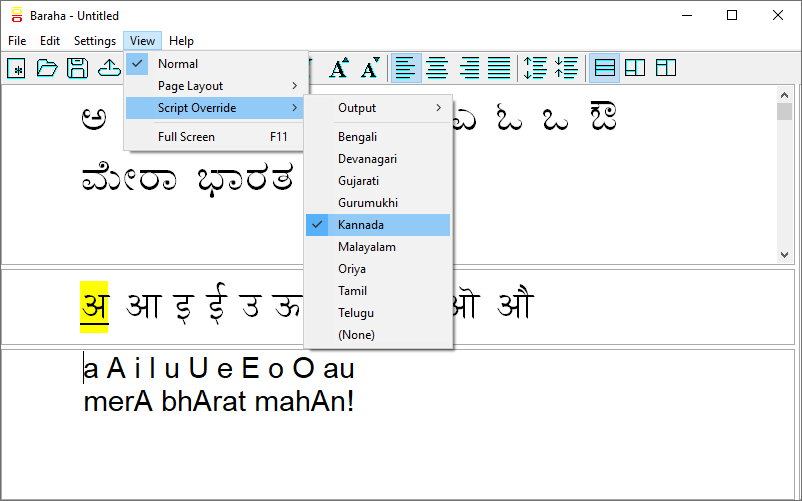

Script override ( View | Script Override menu) is a very useful feature using which, you can read the text of one Indian script in another Indian script or ISO15919 script. For example, let's say you received an email as a .BRH document which contains Hindi text. Let's say you understand Hindi language but not comfortable in reading devanagari script. Now, using the script override feature you can read the Hindi text in another familiar script say Kannada.
All the Indian scripts are derived from the Brahmi script, which is also the underlying concept in Baraha. Baraha uses a common code (BRHCODE) for representing all the Indian languages. So, it is possible to convert text from one script to another. Most of the characters exist in all the scripts. Some characters may not exist in some scripts in which case, Baraha tries to map to the nearest possible character. If it is impossible to map a character, it gets ignored. This underlying principle is used to provide the Script override feature of Baraha.
Note in the above example, just by changing the language from Hindi to Kannada in the Language Settings (or by using the language switch lang=kan), you may not get the 100% proper conversion to Kannada script. This is due to the slight differences between the phonetic keyboards of different scripts. Some scripts don't have characters that are in the other scripts. For example, Devanagari script has a special symbol called oum (BRHCODE_OM) which is not present in other scripts. When Script override is used, the Kannada plugin maps it to BRHCODE_O + BRHCODE_ANUSWARA. If you use <lang=kan>oum instead, you will get BRHCODE_au + BRHCODE_m, which is incorrect. Similarly, the Tamil plugin maps BRHCODE_K, BRHCODE_g, BRH_CODE_G codes to BRHCODE_k.
Script override is useful for learning Indian scripts.